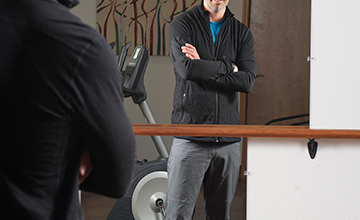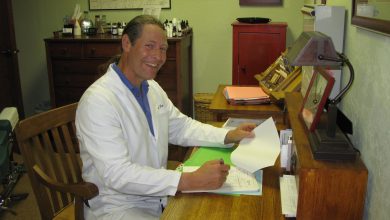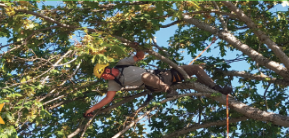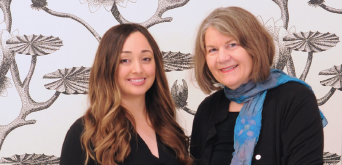Richard Herskowitz – Ashland Independent Film Festival
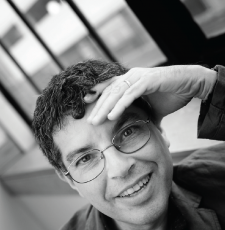 Richard, thanks so much for speaking with us today. Please tell us a little about yourself and your background in the arts.
Richard, thanks so much for speaking with us today. Please tell us a little about yourself and your background in the arts.
I became a cinephile as an adolescent. My New York City schoolteacher parents summered in Ithaca, NY, and they would drop me off many nights of the week at Cornell Cinema, where I was exposed to Godard, Bergman, the Marx Brothers and Kurosawa among many others. I alternated between the ambitions of becoming a filmmaker or a film scholar. Then, years later, when a position for the director of Cornell Cinema opened up, I realized that becoming a film programmer was my calling.
For twelve years, I programmed over 500 films a year for that film society, until film societies started being replaced by film festivals. I was then hired to run the Virginia Film Festival where 90% of what I selected related to a theme (like “Wet” and “Cool” and “Animal Attractions”) that changed every year. After 14 years in Charlottesville, my wife was hired as the director of the Jordan Schnitzer Museum of Art in Eugene. She had followed me to Charlottesville, and it was my turn to follow her to Oregon.
In 2008, I started two new jobs as the director of the Cinema Pacific Film Festival at the University of Oregon, which was a teaching festival designed to engage students in festival administration, and as artistic director of the new Houston Cinema Arts Festival, which is devoted to films about the arts. I still do Houston, but I gave up Cinema Pacific for the Ashland Independent Film Festival. When I visited here in 2014, I was very jealous of Joanne Feinberg for having such a huge, committed audience and guest filmmakers that were clearly besotted with the local culture and environment. When Joanne, who did so much to build this festival, moved on from the position of Director of Programming, I leaped at the opportunity.
Please tell us about your role as gatekeeper at the Ashland Independent Film Festival.
As the gatekeeper, I solicit input from many people. I work with over 20 screeners who look at the 850+ submissions that come in from all over the world. After those evaluations are complete, there is a group of 7 associate programmers who join me in reviewing the highest-rated titles. They also advise me on the final selection. They know the community and the festival’s history better than I do, and are invaluable consultants. We are now at the point where we have about 100 films we would love to show, and are making hard choices. I am also headed to Sundance, where I’m going to find some exciting upcoming releases that will provide the “icing” for this nearly baked cake.
Your job also entails working with different groups and organizations within the community.
Yes, this is the second year in which we’re partnering with the Schneider Museum of Art. I co-curated a media art exhibition with the museum director Scott Malbaurn. That show will go on view on April 5th, the night before the festival begins. One of the artists will present a live music and film performance on April 8th in the museum as part of this year’s programming. Also, this year we have been working with our new Education Coordinator, Jana Carole, on arranging school visits for several of our guest artists. I recently met with OSF Education staff, and we’re beginning to plot future collaborations with them as well.
Richard, you try to attend at least three major film festivals per year. Tell us about them and then how you see them comparing with the Ashland Independent Film Festival.
I try to make it every year to Sundance, Toronto, and Cannes.
These are festival marketplaces, where I get to see documentary and narrative feature films fresh out of the gate, and also a wide range of experimental and installation work. Ashland is not a market where distributors come to compete with each other for the hottest new titles. We are more of a retreat, a place where filmmakers come to recharge their batteries, to connect with a smart and passionate audience that wants to discuss the underlying motivations behind the herculean effort involved in making an independent film. Plus, they like it here. MovieMaker Magazine has again identified Ashland as one of the Top 50 Places to Live and Work as a Filmmaker in 2017.
What role and purpose do you see independent film festivals playing in our culture?
The underlying purpose of film festival programming is to supplement what is provided by the mainstream mass media, to expose alternative voices and forms of filmmaking that are generally marginalized. Independent film is the arena in which marginalized cultures and artistically experimental voices are heard, and we are the Ashland Independent Film Festival, devoted to building this arena. This mission is becoming more and more urgent for me and for many others, since the #oscarssowhite controversy and the recent studies showing shamefully low female representation among Hollywood directors. I also believe that film festivals are preserving the collective experience of filmgoing. People gather in large numbers (especially in Ashland) and interact with each other and the films’ creators. There is participation and two-way communication, rather than the mere consumption of spectacle (and popcorn).
Tell us more about the move towards experimental and live cinema experience.
As much as I believe that the theatrical collective movie experience is vital, I also think that film festivals should be laboratories for exploring emerging forms of moving image creation. Last year, I brought two animators who performed live music and theatrical vignettes alongside their films. We brought a musician who performed the musical score of a sound feature film live in the theater. This year, in addition to a live, multi-screen music and film performance at the Schneider Museum, we are expecting to bring a filmmaker who will orchestrate audience participation in the production of the film’s soundtrack.
How do you see long-form television continuing to evolve?
I do recognize that long-form television is a vital area of cinematic creation these days. The big wide screens are giving cinematographers a cinematic canvas, and the season of episodes allows talented screenwriters and directors, many of whom come out of independent film, to develop complex characters and storylines. I just heard one of our greatest creators of long-form television, Vince Gilligan (“Breaking Bad” and “Better Call Saul”), say that he cherishes the opportunities he gets to show his episodes to live audiences! I think we should be showing episodes of series in our festival, and I hope to explore this in the future.
Richard, how do you see the Ashland Independent Film Festival evolving over time?
I expect we will continue to explore new forms of indie media production, from virtual reality to long-form series to interactive gallery installations and “live cinema” performances. But rather than just stuffing all this, and 100+ short and feature films, into a jam-packed weekend in April and in our collaboration with Coming Attractions Theatres in the Varsity World Film Week in October, I hope we can do more year-round programming. This will benefit local audiences and the artists who love to come here to engage with them and soak up the beautiful environment. Our small staff is very, very stretched right now, putting on our current programs and seeing to all the details that make this such a great experience for the filmmakers, so we’re seeking new resources and support to realize these goals. We have a great new executive director, Steven Remington, and a committed group of current and emeritus board members, so I’m very optimistic.
Learn More:
Ashland Independent Film Festival
www.ashlandfilm.org

